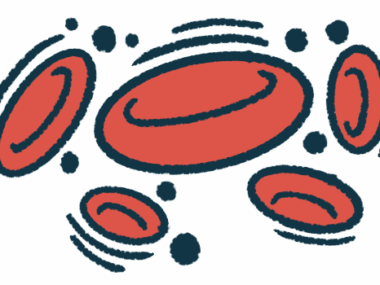Enjaymo Led to Hemoglobin Gains, Less Need for Blood Transfusions
Written by |

Enjaymo (sutimlimab) quickly led to increases in hemoglobin and lowered the need for blood transfusions in four women with cold agglutinin disease (CAD), in whom the treatment remained safe and effective for about three years, according to data from a Phase 1 open-label extension trial.
Trial data was reported in the study, “Sustained sutimlimab response for 3 years in patients with cold agglutinin disease: A phase I, open-label, extension trial,” published in the British Journal of Haematology.
Enjaymo, marketed by Sanofi, acts by blocking an immune protein called C1 that’s involved in the body’s misdirected autoimmune attacks on red blood cells that occur in CAD. The medication prevents these cells from being broken down in a process called hemolysis and is intended to prevent CAD patients’ need for blood transfusions.
The therapy became the first approved treatment for CAD in the U.S. in February. Its approval was backed by data from the Phase 3 CARDINAL trial (NCT03347396). Data from CARDINAL showed the treatment led to increased blood levels of hemoglobin — the protein red blood cells use to carry oxygen through the body — and that most participants did not need blood transfusions after five weeks.
A team of researchers reported data from an open-label Phase 1 trial that evaluated Enjaymo’s long-term safety and effectiveness in four CAD patients between December 2017 and March 2o21 at the Medical University of Vienna.
All four patients, who were post-menopausal Caucasian females, ages 56–78, had participated in the first in-human Phase 1 trial of Enjaymo (NCT02502903). They then participated in a named patient program, which provides patients with access to therapies not available in their own country.
After a washout period ranging from six to 47 weeks, participants then resumed treatment with Enjaymo as part of an extension of the earlier Phase 1 trial. They were treated with fixed dose into-the-vein infusions every other week, based on their body weight, for 13–39 months (about a year to more than three years).
At the study’s start, two participants had cold agglutinins — the antibodies responsible for the autoimmune attacks seen in CAD. The other two had higher levels of these antibodies as well as other immunoglobulins — antibodies the body produces that can activate the C1 protein involved in the disease’s autoimmune cascade.
Participants were monitored for the occurrence of breakthrough hemolysis, defined as a drop in hemoglobin levels and an increase in bilirubin, a waste product produced when red blood cells are broken down.
Median hemoglobin levels when transitioning out of the named patient program were at 117 g/L. After the washout period and when re-initiating treatment, median hemoglobins levels had dropped to 83 g/L.
In the two women who did not have immunoglobulins at the treatment’s start, Enjaymo normalized hemoglobin levels within about three weeks of treatment, with peaks greater than 120 g/L. Bilirubin levels also were normalized.
The other two women also had hemoglobin level increases, but continued to experience some residual hemolysis, reflected by undetectable levels of haptoglobin, a protein that binds hemoglobin.
Enjaymo prevented the need for blood transfusions in all four women.
Over the course of treatment, 130 side effects were reported, 38 of which were mild, 88 moderate, and four severe. Ten were considered related to Enjaymo.
One woman had a short infection-triggered hemolysis after a urinary tract infection, which caused widespread systemic inflammation. A course of antibiotics resolved the issue and she was discharged from the hospital in good condition.
Another discontinued Enjaymo prematurely when a case of previously treated lymphoma returned about nine months after treatment started. Her hemoglobin levels began to drop and Enjaymo was discontinued because she required cancer treatment in the U.K.
“While this trial extension was limited in sample size, the median follow up of 3 years is the first evidence of sustained treatment response for several years, supporting the positive benefit–risk ratio of [Enjaymo] in the treatment of hemolysis in patients with CAD,” the researchers wrote.
This trial was funded by Sanofi, which three of the study’s authors are affiliated with.






